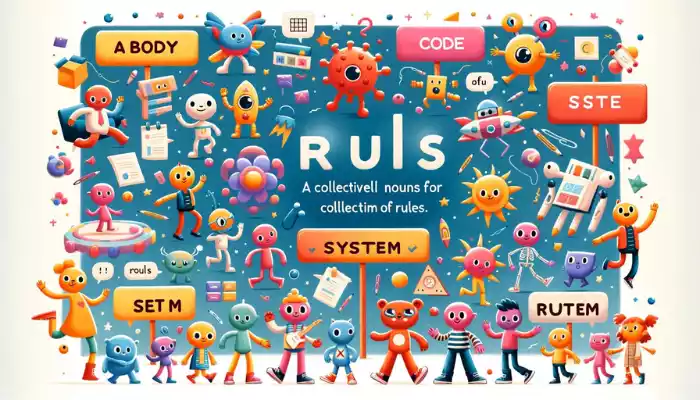Welcome to an exciting journey into the world of language! Today, we’re diving into the fascinating concept of collective nouns, specifically focusing on the term “rules.” Collective nouns are special words used to describe a group of objects, people, or concepts as one whole entity. This not only makes our language richer but also adds a layer of fun to how we express ourselves. Let’s discover together the collective nouns associated with “rules.”
Collective Noun for Rules
| Noun | Collective Noun | Definition | Example |
|---|---|---|---|
| Rules | Body | A group considered as a unit | A body of rules governs the game. |
| Rules | Code | A systematic collection | A code of rules ensures fairness in the competition. |
| Rules | Set | A collection designed to function together | A set of rules outlines the game’s boundaries. |
| Rules | System | An organized scheme or method | A system of rules maintains order in the school. |
| Rules | Framework | A structural plan or basis of a system | A framework of rules supports ethical conduct in business. |
Detailed Explanations and Examples for Rules
1. Body of Rules
A “body of rules” refers to a comprehensive collection of regulations that guide behavior or operations within a specific context. It’s like having a big box filled with different rules that everyone agrees to follow.
- Example 1: In chess, a body of rules determines how each piece moves.
- Example 2: Schools have a body of rules to ensure all students know what behavior is expected.
- Example 3: Sports leagues operate under a body of rules to keep games fair and competitive.
2. Code of Rules
A “code of rules” implies a structured and often formalized set of guidelines. Think of it as a rulebook that outlines do’s and don’ts in clear terms.
- Example 1: Martial arts follow a strict code of rules to respect traditions and ensure safety.
- Example 2: Online forums use a code of rules to keep discussions respectful and productive.
- Example 3: Scouts are taught a code of rules emphasizing honor, duty, and respect for nature.
3. Set of Rules
A “set of rules” is a collection of guidelines meant to be applied together. Imagine a puzzle where every piece is a rule, and putting them together helps everyone know how to act or play.
- Example 1: Board games come with a set of rules to explain how to play.
- Example 2: Classroom rules are a set of guidelines that help students know how to behave.
- Example 3: A set of safety rules helps people know what to do in case of an emergency.
4. System of Rules
A “system of rules” refers to a more complex and interconnected set of guidelines that work together. It’s like a network of roads in a city, each rule leading to another, creating an organized flow.
- Example 1: Governments have a system of rules to manage how countries are run.
- Example 2: Libraries use a system of rules to organize books and manage loans.
- Example 3: Games like soccer have a system of rules that define how points are scored, penalties are given, and games are won.
5. Framework of Rules
A “framework of rules” establishes a foundational structure for activities, behaviors, or operations. Think of it as the skeleton of a building that everything else is built around.
- Example 1: Companies use a framework of rules to ensure all employees are treated fairly.
- Example 2: Environmental laws create a framework of rules to protect natural resources.
- Example 3: Schools design a framework of rules that outline academic expectations and grading policies.
Conclusion
Exploring collective nouns for “rules” uncovers the intricate ways in which language helps us organize and communicate about the world. Whether it’s a body, code, set, system, or framework of rules, each term gives us a unique lens through which to view the guidelines that shape our actions and interactions. By understanding and using these collective nouns, we enrich our conversations and deepen our comprehension of the structures that guide us. Now, let’s make this adventure even more memorable with a visually captivating illustration that brings the concept of collective nouns for rules to life for our young readers.
-
What to Consider When Choosing a 1 Crore Term Insurance Plan for Maximum Coverage
If you’re thinking about getting a term plan, chances are you’ve already come across the option of a 1 crore cover. It’s a round number, and it feels secure. In today’s world of rising costs and financial uncertainty, it sounds like a reasonable fallback for your family. But a large sum assured, while reassuring, isn’t
-
The Benefits of Using AI Management Tools in Business Operations
As artificial intelligence (AI) technology evolves, its influence over business operations continues to grow significantly. AI management tools are becoming vital for companies looking to boost efficiency, optimize decision-making, and offer enhanced customer experiences. By leveraging AI, organizations can automate routine tasks, analyze large datasets, and become more proactive in their strategic approaches. In this
-
The Unspoken Uniform: How the Essentials Hoodie and Tracksuit Quietly Took Over Australia
On a Cool Morning in Fitzroy It’s 7:12 am. Coffee steam curls into the air as the first wave of early risers lines up along Brunswick Street. The barista knows half of them by name. Everyone else blends into a hum of dogs on leads, tote bags, headphones — and noticeably, a sea of soft,
Quiz Time:
Ready to test your knowledge on the fascinating world of collective nouns for rules? Let’s dive into this fun quiz designed for our young readers. Each question is based on the information provided in our article. Choose the best answer for each question, and don’t forget to check your answers at the end!
Quiz Questions
- What is the collective noun used for a comprehensive collection of regulations that guide behavior?
- A) Set of Rules
- B) Body of Rules
- C) Code of Rules
- D) System of Rules
- Which collective noun refers to a structured and formalized set of guidelines?
- A) Framework of Rules
- B) Code of Rules
- C) System of Rules
- D) Set of Rules
- What do we call a collection of guidelines meant to be applied together?
- A) Body of Rules
- B) Set of Rules
- C) Framework of Rules
- D) Code of Rules
- Which term is used for a more complex and interconnected set of guidelines?
- A) Set of Rules
- B) System of Rules
- C) Framework of Rules
- D) Body of Rules
- A ‘framework of rules’ establishes what type of structure?
- A) An organized scheme or method
- B) A foundational structure
- C) A systematic collection
- D) A group considered as a unit
Answers
- B) Body of Rules
- A body of rules refers to a comprehensive collection of regulations guiding behavior or operations within a specific context.
- B) Code of Rules
- A code of rules implies a structured and often formalized set of guidelines, like a rulebook.
- B) Set of Rules
- A set of rules is a collection of guidelines meant to be applied together, like pieces of a puzzle that explain how to act or play.
- B) System of Rules
- A system of rules refers to a more complex and interconnected set of guidelines that work together, organizing flow and operations.
- B) Foundational Structure
- A framework of rules establishes a foundational structure for activities, behaviors, or operations, acting like the skeleton of a building.
Congratulations on completing the quiz! How did you do? Remember, whether you got all the answers right or learned something new, exploring the world of collective nouns is a fun way to expand your language skills and understanding. Keep exploring, and never stop learning!




